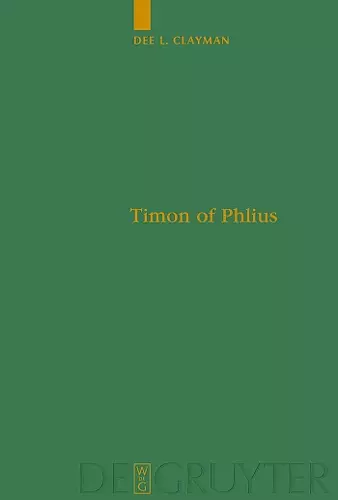Timon of Phlius
Pyrrhonism into Poetry
Format:Hardback
Publisher:De Gruyter
Published:16th Oct '09
Currently unavailable, and unfortunately no date known when it will be back

This book offers a comprehensive analysis of Timon of Phlius's fragments, exploring their literary significance and the context of Hellenistic skepticism.
The series features an array of monographs that delve into Classical Philology and Ancient History, emphasizing a diverse thematic and methodological approach. The editors particularly welcome studies that exhibit a comprehensive and critical engagement with relevant literary texts and primary sources. In this context, Timon of Phlius emerges as a significant contribution, being the first extensive study in English of the fragments of Timon’s works, which were introduced to the world by the poet and philosopher Timon of Phlius in the third century BCE.
Among Timon's extensive oeuvre, only a handful of fragments survive, including the catalogue elegy, the Indalmoi, and the Silloi, a hexameter parody that satirizes philosophers from various eras during a fictional journey to Hades. Dee L. Clayman meticulously reconstructs these fragments, drawing from Diogenes Laertius’s outline and the fragmentary book numbers provided by earlier sources. This reconstruction is a notable advancement since Wachsmuth’s 1885 edition, as it employs careful analysis of syntactic and contextual elements within the text.
Utilizing the Greek text by Lloyd-Jones and Parsons from 1983, Timon of Phlius translates all surviving fragments into English, treating them as literary works rather than mere historical sources. The book also highlights the influence of Timon’s work on key Hellenistic poets, such as Callimachus, Theocritus, and Apollonius of Rhodes, before concluding with a definition of 'Skeptical aesthetics,' situating the unique features of Hellenistic literature within a skeptical framework.
"L'ouvrage n'en demeure pas moins interessant et stimulant intellectuellement. Les paralleles qu'il propose dans la litterature hellenistique temoignent d'une diffusion du pyrrhonisme dans la culture grecque plus importante que ce que les seuls textes philosophiques peuvent laisser penser."Stephane Marchand in: Bryn Mawr Classical Review 2010.09.25
ISBN: 9783110220803
Dimensions: unknown
Weight: 509g
271 pages